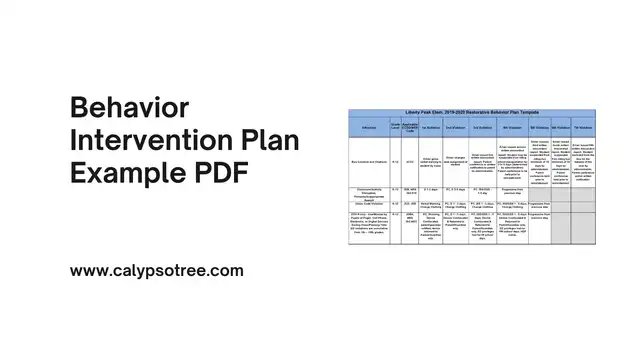A database administrator (DBA) manages databases for companies. Databases are like big digital filing cabinets. DBAs make sure data is safe, organized, and easy to access. They work in many industries and keep data systems running smoothly. Knowing the job description for a database administrator can help you see if this job is a good fit for you.
What is a Database Administrator?
They manage databases, which are like big digital filing cabinets. These databases store all the important information a company needs to operate. The DBA’s job is to make sure the data is safe, organized, and easy to access.
Primary Responsibilities of a Database Administrator
Managing Databases:
DBAs are responsible for managing database systems. This means they create, maintain, and organize the databases where information is stored. They make sure that everything runs smoothly and efficiently.
Ensuring Data Integrity and Availability:
DBAs ensure that the data in the database is accurate and can be accessed whenever needed. This means making sure the data is correct and the database is always up and running.
Backup and Recovery Processes:
DBAs handle the backup and recovery processes. They regularly create copies of the data (backups) so that if something goes wrong, the data can be restored (recovery). This is like having a spare key for a lock, in case the original key gets lost.
Ensuring Data Security:
DBAs protect data from unauthorized access and breaches. They set up security measures like passwords and encryption to keep the data safe. Just like you lock your house to keep it secure, DBAs lock up the data to protect it from hackers.
Handling Database Performance Issues:
DBAs work on improving the speed and efficiency of databases. They find and fix issues that can slow down the system. This is similar to tuning a car engine to make sure it runs smoothly.
Skills Required to Become a Successful Database Administrator
Technical Skills:
DBAs need strong technical skills. They must know how to use SQL, a special language for managing and querying databases. SQL helps DBAs create, update, and delete data in the database.
They also need to understand how databases are designed and structured. Think of it like knowing the rules of a game and the layout of the playing field.
If you know the rules and layout, you can play the game well. Similarly, if a DBA understands SQL and database structure, they can manage the database effectively.
Analytical and Problem-Solving Skills:
DBAs must be good at analyzing problems and finding solutions. They need to think critically and figure out why something isn’t working and how to fix it. It’s like being a detective solving a mystery.
When a problem arises in the database, a DBA must investigate, find the cause, and fix it. This requires patience, attention to detail, and a logical approach.
Communication and Teamwork:
DBAs often work with other IT professionals, so good communication and teamwork are essential. They need to explain technical details to people who may not be as tech-savvy. Imagine teaching someone how to ride a bike – you need to be clear and patient.
In the same way, a DBA must explain complex technical issues in simple terms so that everyone on the team understands.
Good communication ensures that projects run smoothly and everyone is on the same page. Working well with others and being a team player are crucial for a DBA’s success.
Educational Qualifications for a Database Administrator
Degrees in Computer Science or Information Technology:
Most DBAs have degrees in computer science or IT. These programs teach them the skills needed for the job. Learning about computers and how they work helps DBAs understand databases better. It’s like learning the basics before becoming an expert.
Certifications:
DBAs can also earn certifications, like those from Oracle or Microsoft. These certifications show that they have specific skills and knowledge needed for the job. It’s like getting a special badge that proves you are good at something. These certifications often require passing exams to prove your abilities.
On-the-Job Training:
Some DBAs learn their skills through on-the-job training. They might start in junior positions and learn from more experienced DBAs. This hands-on experience is valuable and helps them understand real-world problems and solutions. It’s similar to learning by doing, which can be very effective.
Types of Databases Managed by Administrators
Relational Databases:
DBAs often work with relational databases like MySQL and PostgreSQL. These databases organize data into tables, which makes it easy to find and use. Think of it like a big spreadsheet where everything is neatly arranged in rows and columns.
NoSQL Databases:
Some DBAs work with NoSQL databases like MongoDB and Cassandra. These databases are good for handling large amounts of unstructured data, which doesn’t fit neatly into tables. It’s like having a big storage box where you can throw all sorts of items without worrying about keeping them in order.
Cloud Databases:
Many DBAs now manage cloud databases, which are stored on remote servers instead of local computers. Examples include databases on AWS (Amazon Web Services) and Microsoft Azure. Cloud databases are flexible and can be accessed from anywhere, making them very convenient. It’s like storing your files in a locker that you can open from any place with an internet connection.
Hybrid Databases:
Some DBAs work with hybrid databases that combine features of both relational and NoSQL databases. These databases offer the structure of relational databases with the flexibility of NoSQL. It’s like having the best of both worlds in one system.
Specialized Databases:
In some industries, DBAs manage specialized databases designed for specific tasks, such as geographic information systems (GIS) databases. These databases handle particular types of data and require unique skills to manage effectively. It’s like using special tools for a specific job.
How Do Database Administrators Ensure Data Security?
Access Controls:
DBAs set up access controls to ensure that only authorized people can see or change the data. They create user accounts with different levels of access based on what each person needs to do. This is like giving different keys to different people so they can only open certain doors.
Encryption:
DBAs use encryption to protect data. Encryption means converting data into a code that can only be read with a special key. This way, even if someone gets hold of the data, they can’t understand it without the key.
Regular Security Audits:
DBAs perform regular security audits to check for any weaknesses in the system. They look for potential vulnerabilities that hackers could exploit and fix them before any damage is done. This is like regularly checking your home for any weak spots where a burglar could get in and reinforcing them.
Firewalls and Antivirus Software:
DBAs use firewalls and antivirus software to protect databases from malicious attacks. Firewalls act as barriers that prevent unauthorized access, while antivirus software detects and removes harmful programs.
What Is the Typical Career Path for a Database Administrator?
- Entry-Level Positions: Most DBAs start in entry-level positions such as junior DBAs or database developers. In these roles, they learn the basics of managing databases and gain practical experience.
- Mid-Level Positions: After gaining some experience, DBAs can move up to mid-level positions. These include roles like DBA or senior DBA, where they take on more responsibilities and manage larger and more complex databases. This is similar to moving from an apprentice to a journeyman who can handle more tasks independently.
- Advanced Positions: With several years of experience, DBAs can advance to senior roles such as database architects or IT managers. In these positions, they design database systems and oversee large IT projects.
- Specializations: Some DBAs choose to specialize in certain areas, such as data security or cloud databases. Specializing allows them to become experts in a specific field and take on more specialized roles.
What Tools and Software Do Database Administrators Commonly Use?
Database Management Systems (DBMS):
DBAs use DBMS software like Oracle, SQL Server, and MySQL to create and manage databases. These systems help them organize and store data efficiently. It’s like using special tools to build and maintain structures.
Monitoring Tools:
DBAs use monitoring tools like Nagios and SolarWinds to keep an eye on database performance. These tools alert them to any issues that need attention.
Development Tools:
Tools like SQL Developer and Toad help DBAs write and test code for databases. These tools make it easier to create, modify, and optimize database queries.
Backup and Recovery Tools:
DBAs use tools like RMAN (Recovery Manager) and Veeam to create backups and restore data. These tools ensure that data can be recovered quickly in case of any loss.
Security Tools:
DBAs use security tools like encryption software and firewalls to protect data. These tools help them set up secure systems that prevent unauthorized access.
Emerging Tools:
Discuss new and emerging tools that DBAs should be aware of, highlighting their features and benefits.
Technology Comparisons:
Compare popular database management tools, discussing their pros and cons.
How Do Database Administrators Handle Database Performance Issues?
- Performance Tuning: DBAs work on performance tuning to make databases run faster and more efficiently. They adjust settings and configurations to optimize performance. This is like fine-tuning a musical instrument to make sure it sounds perfect.
- Indexing: DBAs create and manage indexes, which help speed up data retrieval. Indexes are like an index in a book that helps you find information quickly.
- Query Optimization: DBAs analyze and optimize database queries to make them run faster. This involves rewriting queries to make them more efficient.
- Regular Maintenance: DBAs perform regular maintenance tasks like updating software, cleaning up unused data, and monitoring system performance. This keeps the database running smoothly and prevents problems before they happen.
- Monitoring Tools: DBAs use monitoring tools to track the performance of databases. These tools alert them to any issues that need attention.
What Industries Employ Database Administrators?
Technology Companies:
Many DBAs work in tech companies that need to manage large amounts of data. These companies rely on databases to store user information, transactions, and other critical data. It’s like being the librarian in a very big and busy library.
Financial Services:
Where data accuracy and security are critical. Banks and financial institutions need DBAs to manage their databases and ensure that all transactions are recorded accurately.
Healthcare and Pharmaceuticals:
These industries rely on DBAs to manage patient and research data. Healthcare providers need to store and access patient records quickly and securely.
Government Agencies:
Government agencies use DBAs to handle sensitive data and maintain databases. They need to store and manage data related to citizens, services, and various government functions. It’s like organizing and maintaining a massive collection of records for a large organization.
Retail and E-Commerce:
DBAs are also employed in the retail and e-commerce industries. They manage databases that store product information, customer data, and sales transactions.
Education:
These databases help educational institutions keep track of grades, schedules, and research projects. It’s like maintaining a detailed record system for a large school.
Manufacturing:
These databases help ensure that production runs smoothly and efficiently. It’s like overseeing a detailed plan to make sure everything in a factory works perfectly.
What is the Average Salary of a Database Administrator?
A database administrator (DBA) plays a crucial role in managing and securing data for companies. Their salary can vary depending on factors like experience, location, and industry. Let’s look at the average salary ranges for DBAs from different sources.
Salary Estimates from Various Sources
Indeed:
- According to Indeed, the average salary for a database administrator in the United States ranges from $54,000 to $110,000 per year. Indeed gathers salary data from job postings and user-reported salaries.
Glassdoor:
- Glassdoor reports that the average salary for a database administrator in the United States is between $100,000 and $150,000 per year. This information is based on anonymous salary reports from employees.
Salary.com:
- According to Salary.com, the average salary for a database administrator ranges from $79,000 to $130,000 per year. Salary.com uses HR-reported data and compensation surveys to provide accurate salary ranges.
Built In Chicago:
- Built In Chicago states that the average salary for a database administrator in Chicago, IL, is between $100,000 and $200,000 per year. Built In Chicago focuses on tech and startup companies in the Chicago area.
ZipRecruiter:
- ZipRecruiter reports that the hourly wage for a database administrator in the United States ranges from $29 to $68 per hour. This translates to an annual salary range of approximately $60,320 to $141,440. ZipRecruiter aggregates data from job listings and user-reported salaries.
PayScale:
- According to PayScale, the average salary for a database administrator in the United States ranges from $50,000 to $120,000 per year. PayScale collects salary data from users who report their earnings and job details.
Built In:
- Built In provides a broader range, stating that the average salary for a database administrator in the United States is between $69,000 and $260,000 per year. This wide range includes various levels of experience and company sizes.
The salary of a database administrator can vary widely based on several factors. On average, DBAs can expect to earn between $54,000 and $150,000 per year. However, in some locations and industries, the salary can be higher. It’s important to consider these factors when looking at salary expectations for a DBA role.
References:
- Indeed Database Administrator Salaries
- Glassdoor Database Administrator Salaries
- Salary.com Database Administrator Salaries
- Built In Chicago Database Administrator Salaries
- ZipRecruiter Database Administrator Salaries
- PayScale Database Administrator Salaries
- Built In Database Administrator Salaries
Future Trends in Database Administration
- Cloud Computing: The rise of cloud computing is significantly impacting DBAs. Popular cloud platforms like AWS, Google Cloud, and Microsoft Azure are becoming essential tools for DBAs.
- Big Data: Handling big data is an increasing trend. DBAs need to be skilled in big data tools like Hadoop and Spark to manage large data sets efficiently.
- AI and Machine Learning: AI and machine learning are being integrated into database management to improve data analysis and decision-making.
Challenges Faced by Database Administrators
- Data Security Threats: DBAs face challenges in keeping data secure from cyber threats and breaches.
- Performance Issues: DBAs encounter performance issues that require strategic solutions to maintain efficient database operations.
- Keeping Up with Technology: The fast-paced evolution of database technologies demands continuous learning and adaptation from DBAs.
- Tips for Aspiring Database Administrators
- Continuous Learning: Aspiring DBAs should stay updated with the latest technologies and trends through online courses, certifications, and reading materials.
- Networking: Networking with other professionals through conferences, forums, and professional organizations is crucial.
- Practical Experience: Gaining hands-on experience through internships, projects, and real-world practice is invaluable.
Sample Job Description for a Database Administrator
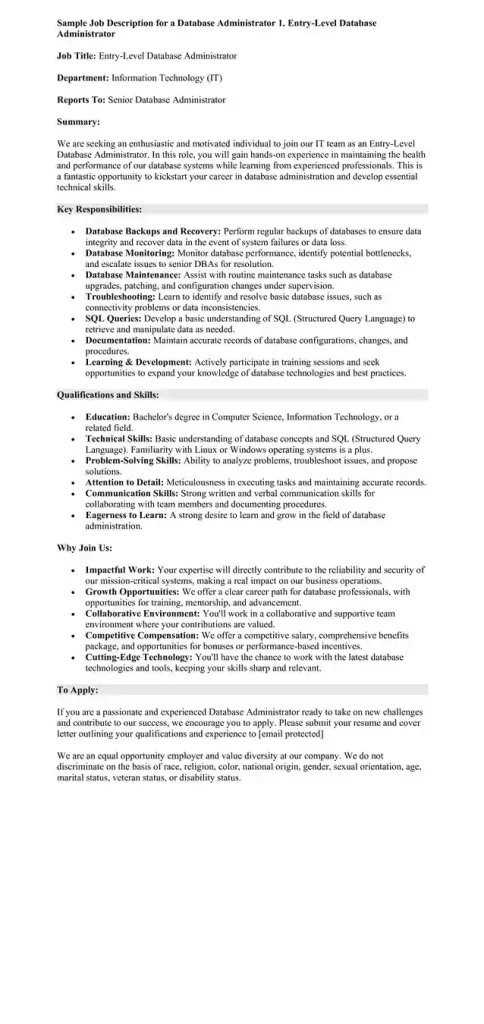
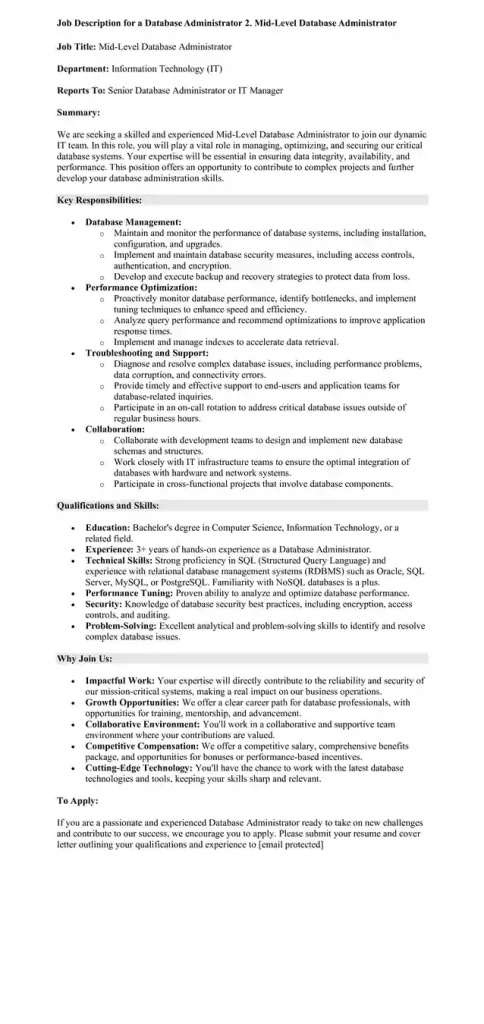
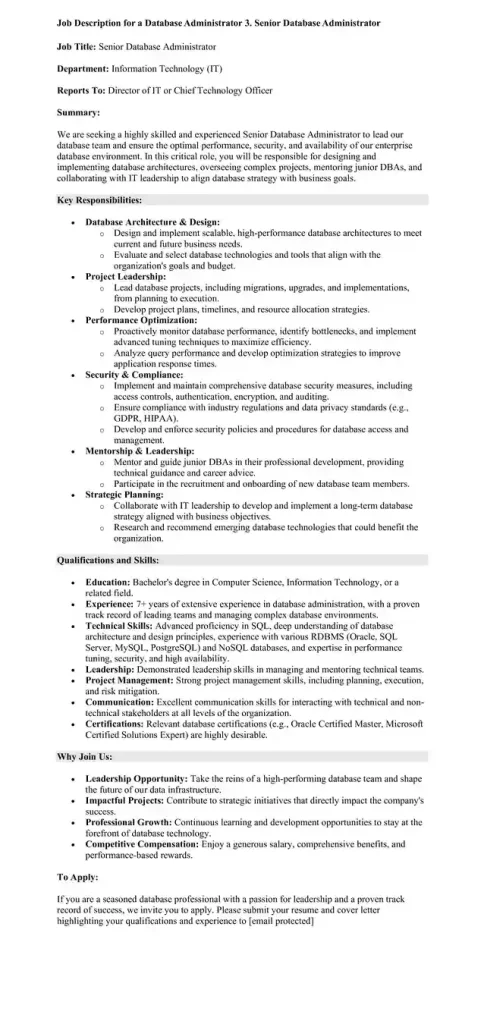
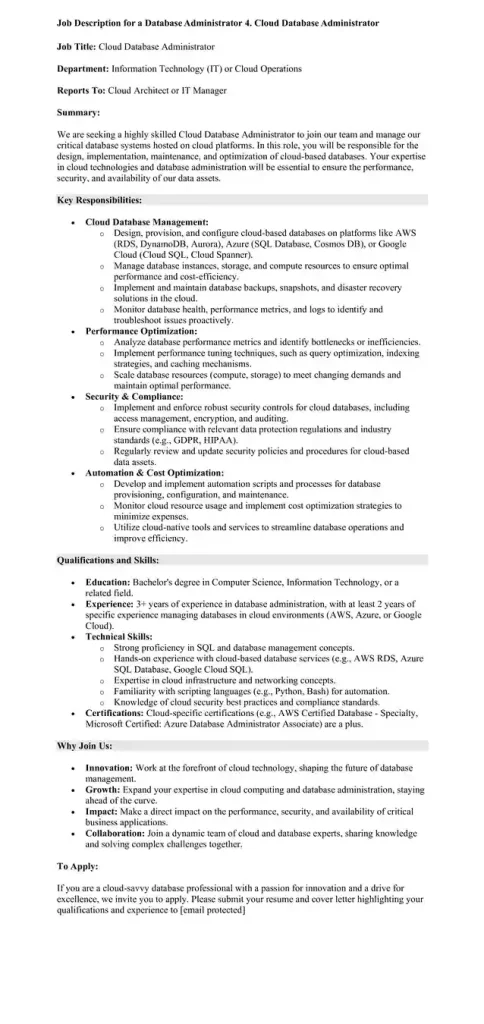
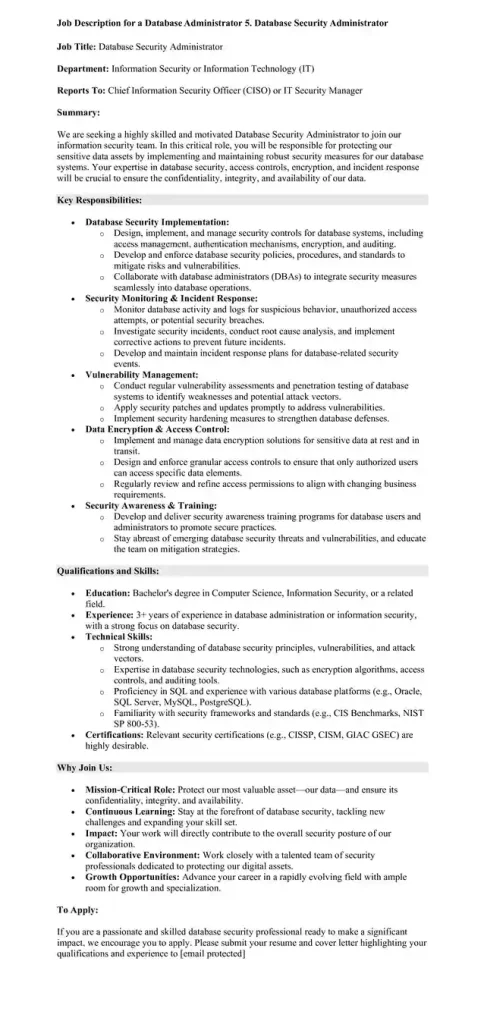
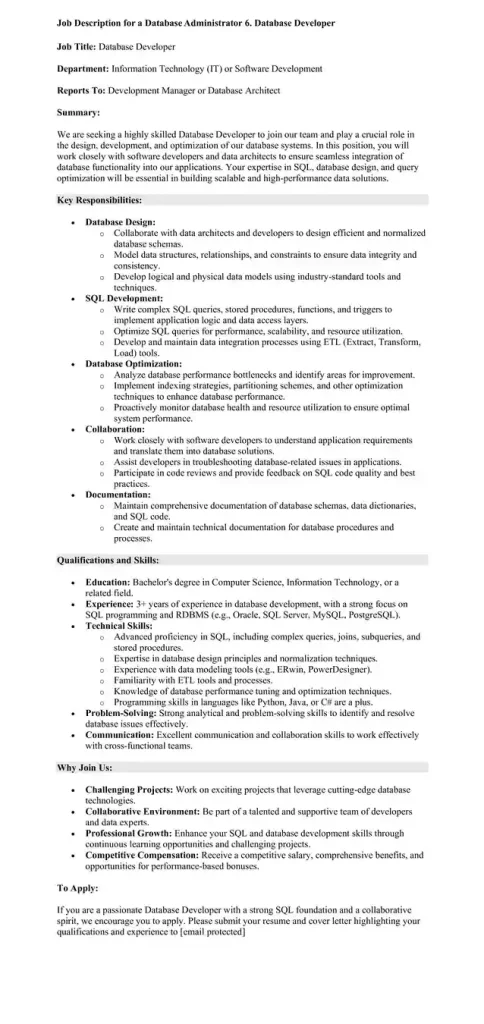
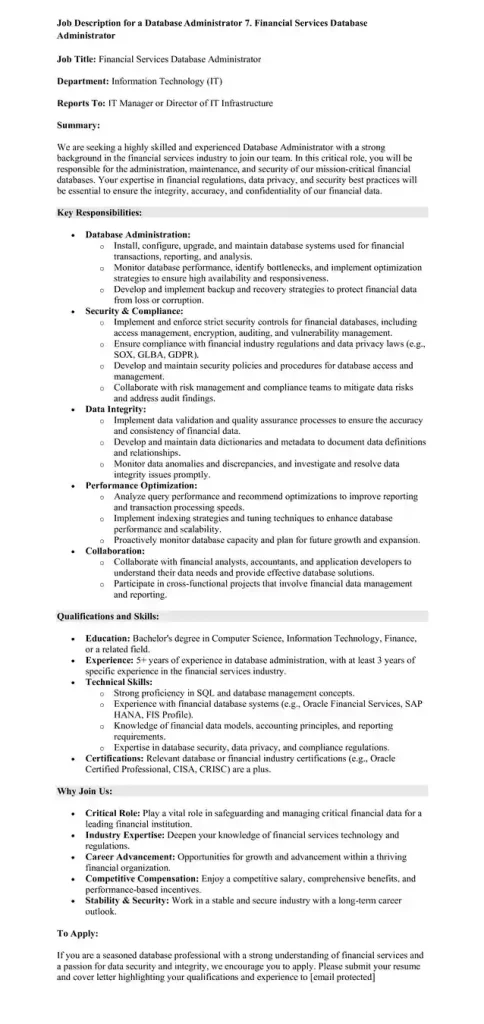
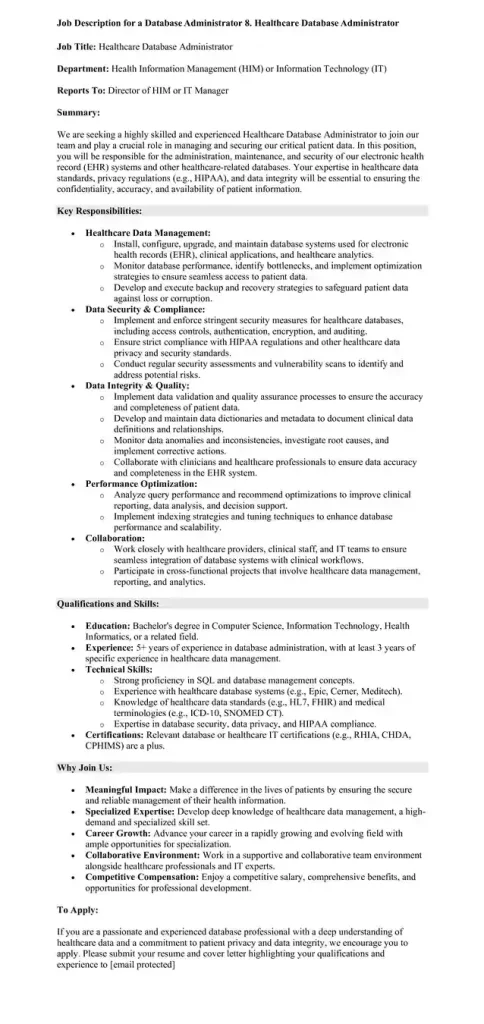
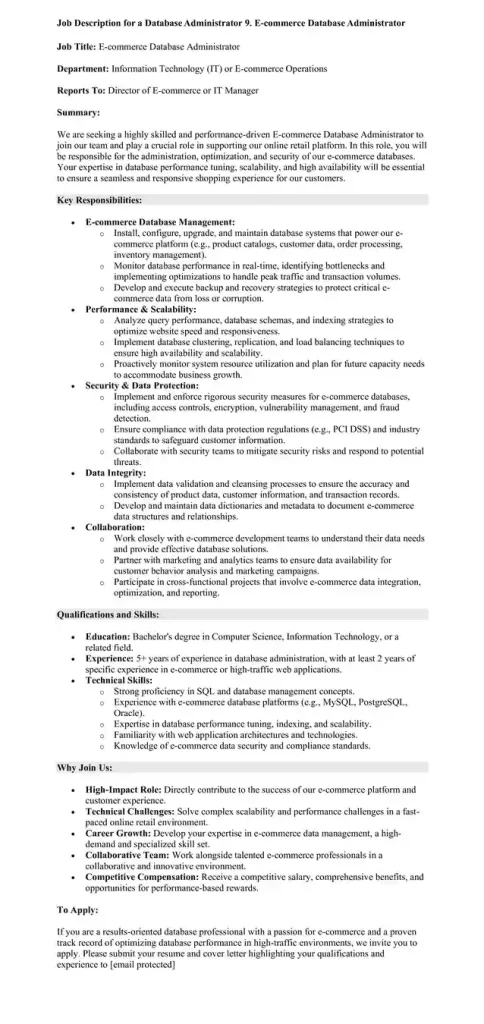
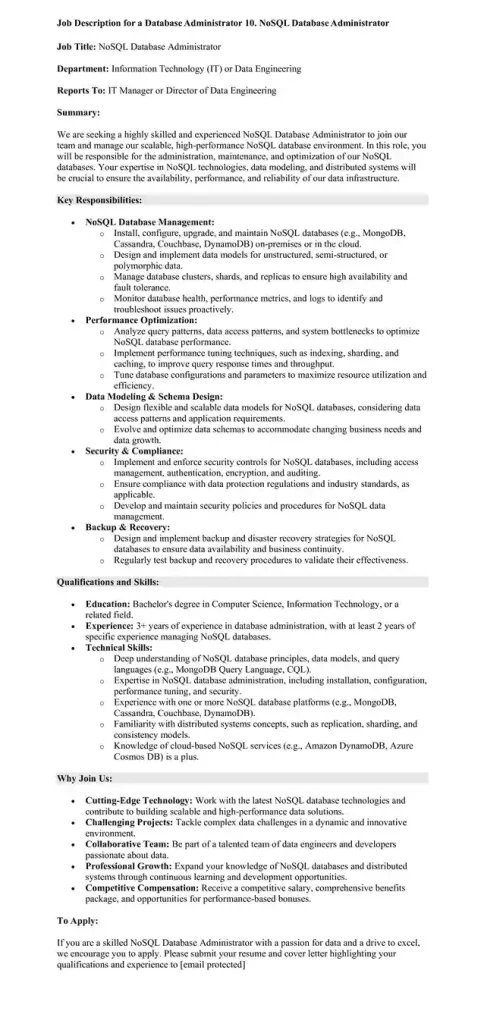
Benefits of a Database Administrator
Keeping Data Safe:
One of the biggest benefits of having a database administrator (DBA) is data safety. A DBA makes sure all the important information a company has is protected.
Organizing Data:
A DBA organizes data so it is easy to find and use. They arrange the information in the database in a way that makes sense. This helps everyone in the company find what they need quickly. Imagine a library with books neatly arranged in order. You can find the book you want without any trouble. In the same way, a DBA makes sure the data is well-organized and easy to access.
Ensuring Data is Available:
A DBA makes sure the data is always available when needed. They check the database regularly to make sure everything is running smoothly. If there is a problem, the DBA fixes it quickly so that the data can be accessed again.
Backing Up Data:
DBAs create backups of the data regularly. This means making copies of the data and storing them safely. If something goes wrong and the original data is lost, the DBA can use the backup to restore it.
Improving Database Performance:
DBAs work on making the database run faster and more efficiently. They find and fix issues that can slow down the system. This is similar to tuning a car engine to make sure it runs smoothly. By improving performance, a DBA ensures that everyone can use the database without any delays or problems.
Summary
The job description for a database administrator includes many tasks like managing databases and keeping data secure. DBAs are important in companies, making sure data is safe and easy to access. With the right skills and education, being a DBA can be a rewarding career with many job opportunities. Whether you are starting out or looking to move up, the role of a DBA offers a good salary and a promising career path.

Alexander is a skilled HR expert who writes clear and compelling job descriptions. He has spent over 15 years in the HR field, helping companies find and keep the best employees. With a degree in Human Resources Management from the University of Chicago, he has the knowledge to back up his experience.







